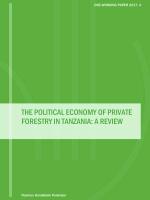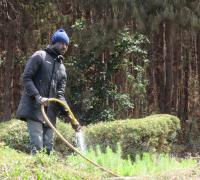Huge potential for private forestry in Tanzania
Tanzania currently faces an acute shortage of timber that can only be met by private tree growers. The government acknowledges the importance of the private sector, but it fails to support the non-industrial private forest (NIPF) producers, who may help bridge the demand, in any systematic way. DIIS postdoc researcher Rasmus Hundsbæk Pedersen has written a paper, the Political Economy of Private Forestry in Tanzania: a Review, in which he analyses why.
Based on a review of the existing literature he argues that a combination of path-dependency and vested interests among Tanzanian state authorities has rendered more fundamental changes difficult. State-led management and conservation paradigms have undercut the support for private actors. The paper is part of the Timber Rush: Private Forestry on Village Land research programme, which involves scholars from Sokoine University of Agriculture (SUA), DIIS and the University of Copenhagen.
DIIS Experts



